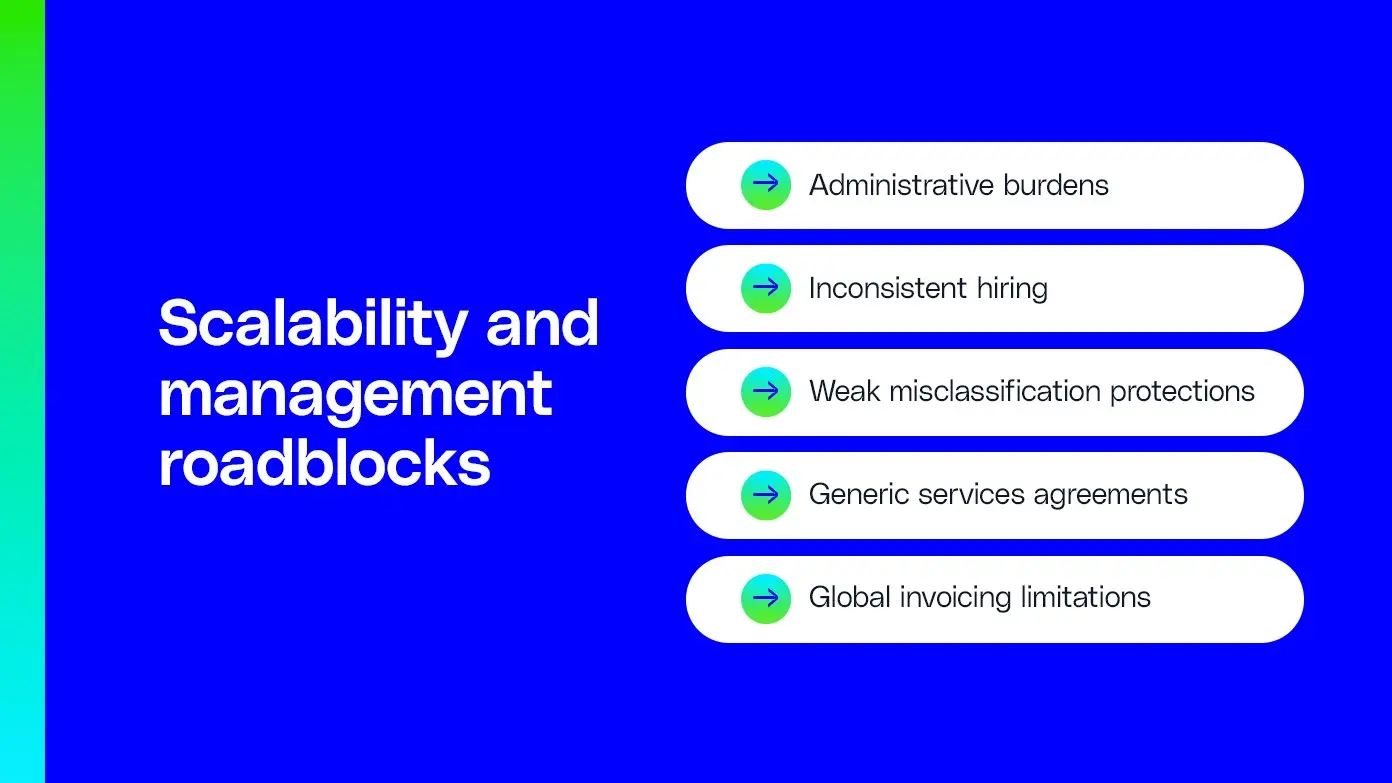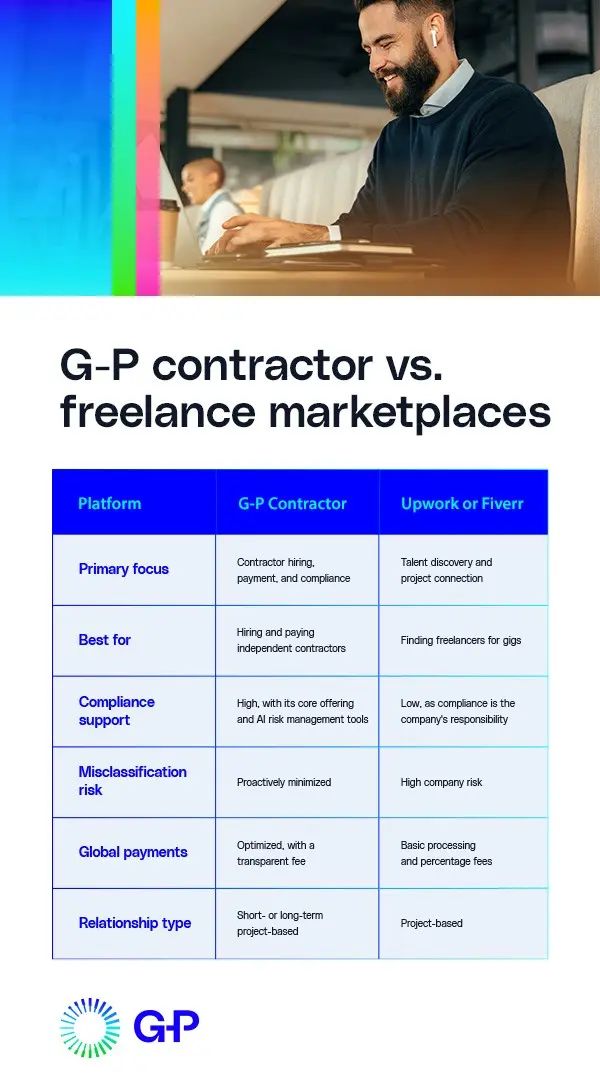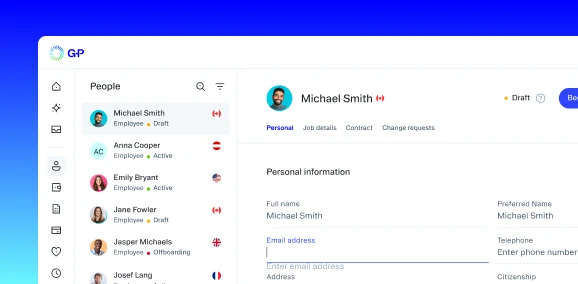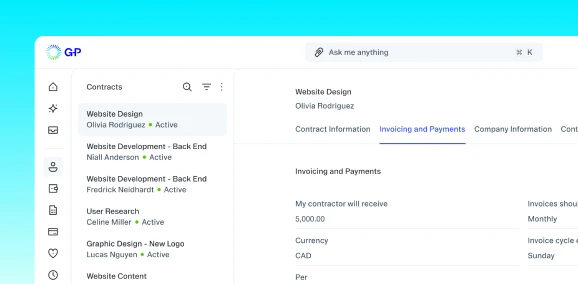Your business is growing, and you need specialized talent to complete projects fast. You've likely explored platforms like Upwork and Fiverr. But, as you scale globally, you need more than just a talent pool. Fiverr or Upwork alternatives like G-P Contractor™ offer everything you need to hire and pay contractors. From ensuring worker classification to simplifying payments and issuing contracts, G-P Contractor is the ultimate solution for all your contractor needs.
Freelancers vs. independent contractors: What’s the difference?
The main difference between freelancers and independent contractors is that independent contractor is the legally recognized term in most countries. Freelancer is a descriptive label, not a legal classification. Freelancers or independent contractors are self-employed professionals who take on short- or long-term projects, typically work for multiple clients simultaneously, and have high autonomy.
The real compliance challenge is differentiating between an independent contractor and an employee. In many jurisdictions, such as the U.S., workers are considered independent contractors if they meet specific legal criteria. Examples include control over work and investment opportunities for profit or loss.
Worker misclassification can lead to severe penalties, including back taxes, unpaid benefits, fines, and even legal action or operational bans in some countries. Standard freelance platforms generally don't protect you from this risk.
Limitations of standard marketplaces: Why businesses seek alternatives
Standard freelance marketplaces are good for finding global talent. However, businesses look for alternatives to these marketplaces due to:
-
Compliance issues: Standard freelance platforms put the burden of worker classification on you. Navigating local labor laws and managing tax forms is also your responsibility.
-
Costly scaling: Percentage-based transaction fees quickly add up.
-
Basic management: Tools are geared toward project tracking, not contractor lifecycle management, compliance documentation, or global invoicing.
The risks of standard marketplaces
While freelance platforms offer access to contractor talent, they come with compliance risks. Governments scrutinize how these platforms classify and manage freelance relationships. Missteps can lead to serious penalties, lost licenses, and reputational damage.
Global regulatory compliance risks

Most freelance marketplaces classify talent as independent contractors. Marketplace platforms also often ignore labor protections, thinking that contractor status exempts them from national labor laws. However, many governing bodies argue that platforms have too much control over contractors, enough for them to be considered employees.
For example, the European Union (EU) passed the Platform Work Directive in 2024. It creates a presumption of employment if certain control-based criteria are met. Noncompliance can trigger backdated tax and social security payments.
Examples of similar rulings in other countries include:
-
U.K.: In 2021, the U.K. Supreme Court ruled that Uber drivers are considered employees, not independent contractors. Uber was forced to pay minimum wage, holiday pay, and pensions. The ruling set a precedent for gig platforms operating in the U.K.
-
Spain: The 2021 Rider Law had food delivery platforms reclassify thousands of contractors as employees.
-
U.S.: In March 2024, the Department of Labor released a new final rule tightening the criteria for independent contractor classification under the Fair Labor Standards Act. Worker misclassification now carries fines and back pay orders.
-
Canada: Provinces such as Ontario and British Columbia have ramped up worker misclassification audits and enforcement. Digital platforms can be fined or ordered to pay back taxes and benefits.
-
Germany: The German Federal Labor Court ruled that platforms exercising organizational control over contingent workers may be considered de facto employers.
Financial and tax exposure
If you treat contractors as employees, it can trigger permanent establishment (PE) risk. When a company has PE, it may owe corporate income tax in different regions, face local reporting, and register as a legal entity. This scenario can also create complex value-added tax, goods and services tax, or digital sales tax obligations.
For example, India's new digital taxation framework requires digital platforms to deduct tax at source on payments to contingent workers. The Australian Taxation Office has also expanded reporting rules under the Sharing Economy Reporting Regime. Platforms must report contractor income to authorities or risk steep penalties.
Intellectual property (IP) and data security vulnerabilities
Freelance marketplaces collect and transfer personal and financial data across borders. These platforms often use generic contract terms that don't offer strong IP protections, posing major risks to your business. Many of these platforms are under scrutiny for noncompliance with local data protection laws.
In the EU, platforms that don't get explicit valid consent or transfer data outside the EU without protection face fines. Likewise, Brazil's General Data Protection Law and China's Personal Information Protection Law require companies to conduct data impact assessments before transferring personal data internationally.
Scalability and management roadblocks

While freelance marketplaces offer quick access to talent, they fall short for scalability and management.
-
Administrative burdens: Freelance marketplaces need manual oversight. As teams grow, admin work becomes unsustainable.
-
Inconsistent hiring: Without standard workflows, each project requires a new, unique hiring process.
-
Weak misclassification protections: Standard platforms don’t shield you from worker misclassification risk. Liability typically falls on the hiring company. Companies looking for that type of protection can use G-P Contractor.
-
Generic services agreements: Most platforms generate standardized services agreements with limited customization features. With our Contractor offering, you can choose between using your contractor agreement or tailor a GP-generated worker contract to meet your needs.
-
Global invoicing limitations: Using multiple payment systems can be challenging for accounting teams as they navigate currency conversion, cross-border compliance, and location-specific payment cycles. G-P Contractor supports multiple payment methods and gives contractors the best experience with flexible payment preferences.
Real-world consequences: Case studies and examples
From fines and legal costs to damaged reputation, companies must get compliance right from the start. Examples of contractor misclassification date back decades and continue to happen today.
In the 1990s, an audit found that thousands of Microsoft contractors were misclassified, working long-term under team supervision. The U.S. Department of Labor pushed for reclassification, leading to tighter internal controls and legal risk mitigation spending.
In Australia, companies misclassifying contractors can face thousands of dollars in penalties per employee under the Fair Work Act.
A G-P™ customer, Five Star Franchising, had challenges with high payment fees and limited invoicing features with their previous provider. They needed new solutions for hiring and paying contractors. With G-P Contractor, they cut operational headaches, simplified payroll and generated detailed reporting for better compliance.
G-P Contractor: The compliance-first solution for hiring independent contractors
G-P Contractor is an alternative to platforms such as Fiverr and Upwork that has many compliance benefits. It's designed specifically for businesses needing a robust, compliant infrastructure for contractor hiring:
-
Compliant contract lifecycle: G-P Contractor automates the creation, signing, and management of locally compliant contracts.
-
Centralized platform: Our centralized platform provides a single source of truth for all contractor data, documents, invoices, and payment history to simplify administration.
Ensure worker misclassification
G-P Contractor directly tackles worker misclassification with:
-
Proactive classification support: G-P Contractor uses deep expertise and AI-powered tools to help you correctly classify independent contractors globally.
-
Contractor classification engine: Our AI classification engine analyzes services agreements and offers precise, actionable recommendations for compliance, ensuring you're always operating within global regulations.
Streamline global contractor payments
If you're tired of big percentage fees, G-P Contractor offers a clear payment alternative:
-
Efficient and transparent: G-P Contractor handles multicurrency payments to over 190 markets with optimized processing. Contractors can submit their invoices, or companies can create and submit invoices on their behalf.
-
Predictable costs: G-P Contractor uses a flat monthly fee per contractor, starting at USD 39 per month per contractor. It's a cost-effective alternative to marketplace platform fees for ongoing engagements.
G-P Contractor vs. freelance marketplaces

A freelance marketplace offers reach and simplicity but carries legal risk. Governments worldwide are revising laws, increasing audits, and issuing fines related to these platforms. For global teams, taking a compliance-first approach is essential.
A compliant solution goes beyond talent access. You need worker classification guidance, tax management, data protection, and payment flexibility in every jurisdiction.
|
Platform |
G-P Contractor |
Upwork or Fiverr |
|---|---|---|
|
Primary focus |
Contractor hiring, payment, and compliance |
Talent discovery and project connection |
|
Best for |
Hiring and paying independent contractors |
Finding freelancers for gigs |
|
Compliance support |
High, with its core offering and AI risk management tools |
Low, as compliance is the company's responsibility |
|
Misclassification risk |
Proactively minimized |
High company risk |
|
Global payments |
Optimized, with a transparent fee |
Basic processing and percentage fees |
|
Relationship type |
Short- or long-term project-based |
Project-based |
Upwork, Fiverr, and other freelance platforms can be beneficial if you want to find talent. However, you need significant internal expertise and processes to handle the compliance and classification risks.
Choose G-P Contractor for compliant contractor hiring
A freelance service marketplace offers easy access to contractor talent, but finding talent is just the first step. When scaling your business globally with contractors, you need a dedicated infrastructure focused on compliance assurance, secure payments, and risk management.
If you want a quick, easy, and compliant way to hire and pay global contractors, G-P has you covered. Book a demo or contact us for more information about G-P Contractor today.





















